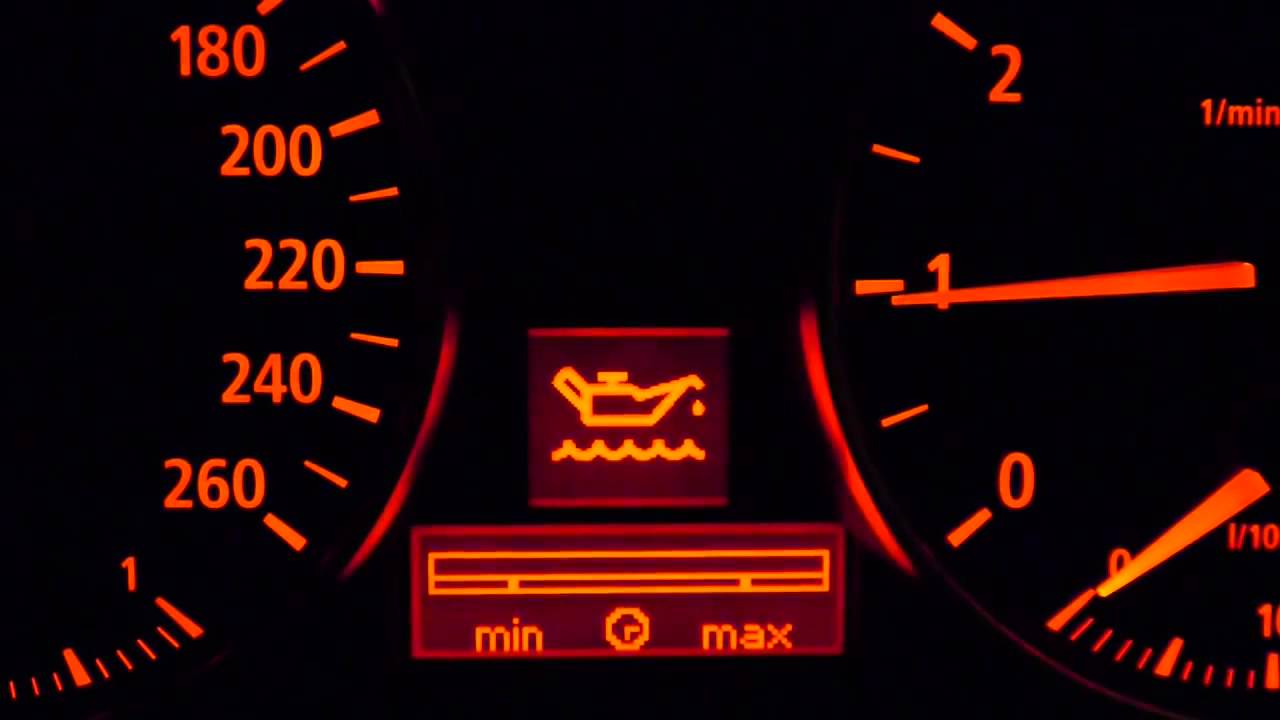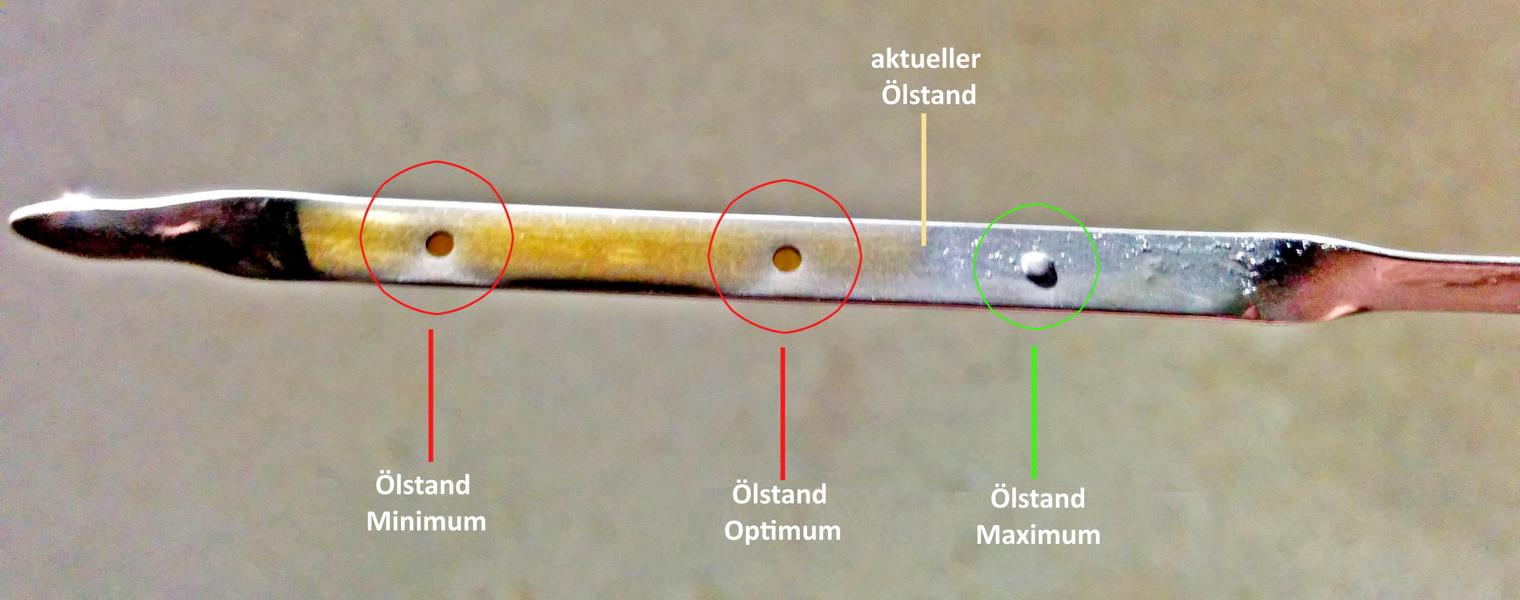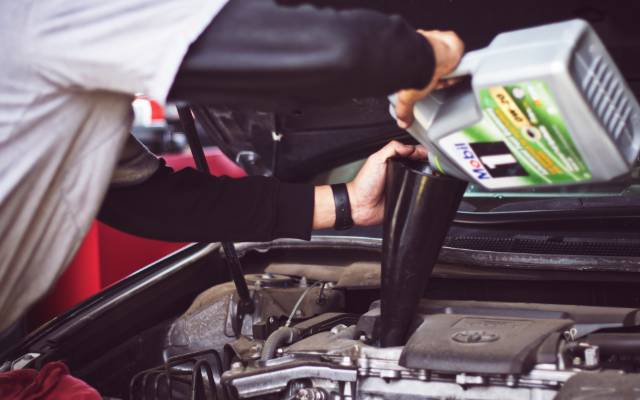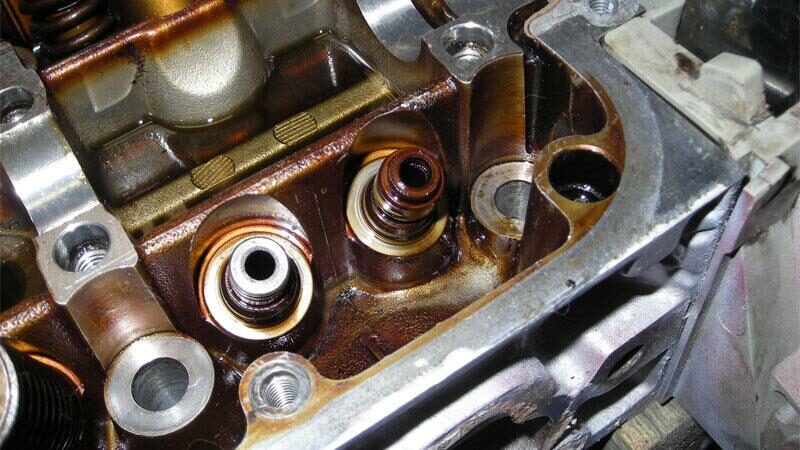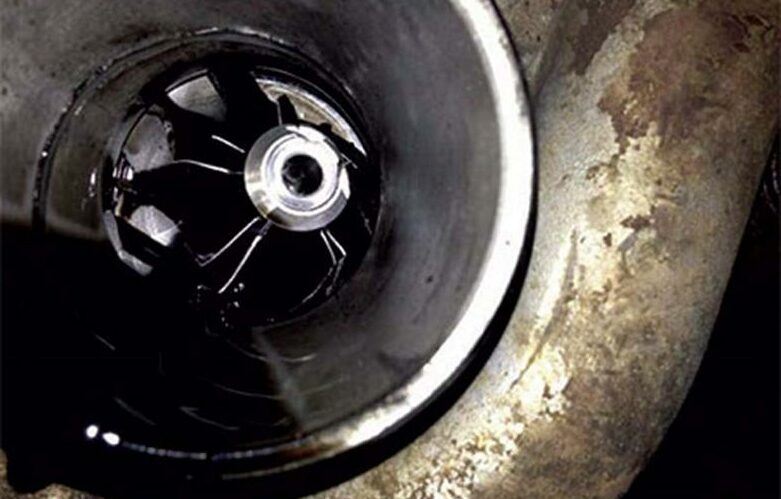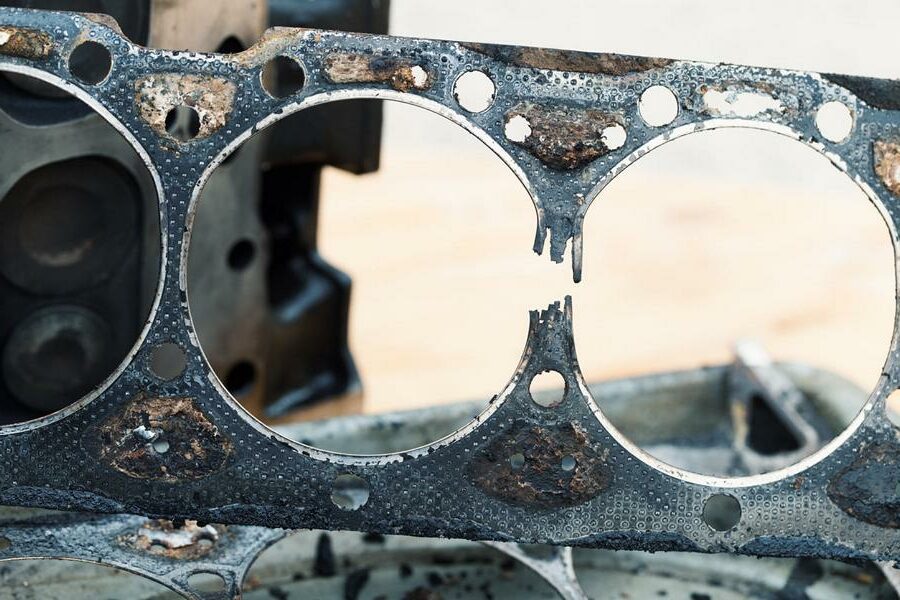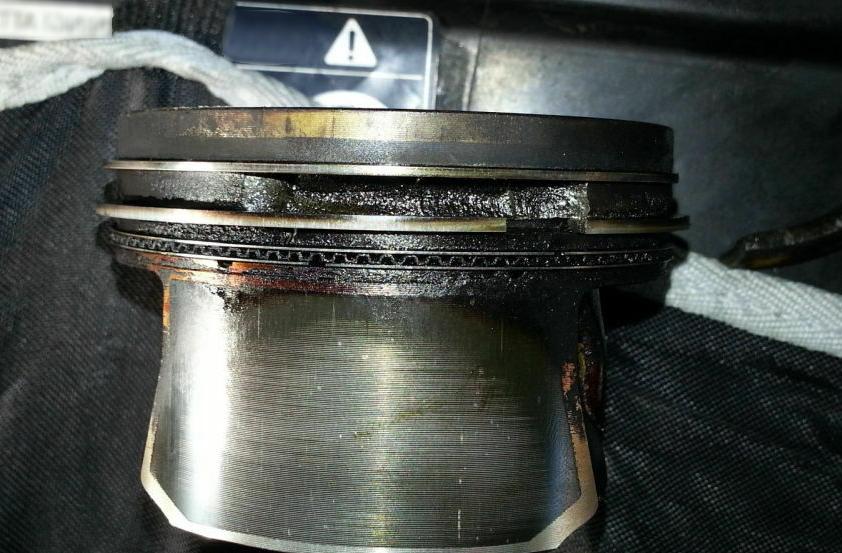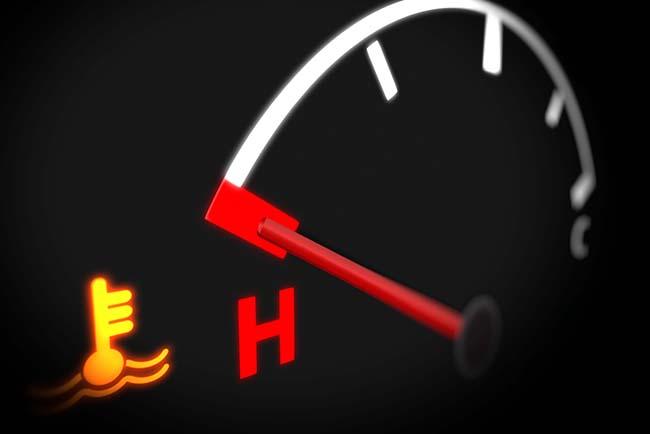Recently updated on January 27, 2022 at 10:34 am
An increased oil consumption can be recognized by the fact that the engine oil has to be topped up more frequently than average. Furthermore, it may be that bluish / blue smoke leaks out of the exhaust, which is particularly noticeable when shifting gears. In newer vehicles, the driver is presented with the message "Check oil level“In the instrument cluster (red oil can) indicates that the oil level is too low. Depending on the manufacturer, the system even shows when and how much Oil needs to be topped up. Depending on the model, for example with the message "Now refill a liter of oil". If the car is an older model, on the other hand, it is essential to check the oil level yourself at regular intervals. Located no increased oil consumption, but one Oil loss or a so-called "oil sweating" before, this is usually through Oil stains detectable. The oil stains can im Engine compartment as well under occur in the vehicle. If a car turns out to be an “oil eater”, there is not only the risk that there is too little oil in the engine and that the engine is damaged, but also that the Geldbörse annoys. Because engine oil can be expensive. Especially when the engine requires a fully synthetic oil. But which typical causes can lead to increased oil consumption and which repairs then have to be carried out? This information can be found in the following guide.
This is how the oil level is checked!
- about the electronic oil level indicator in the instrument cluster (specifies the filling quantity and type depending on the model)
- via the dipstick
- Park the car on a level surface
- Let the engine cool down
- Open the hood
- Pull out the dipstick
- clean with a rag
- Insert the dipstick again as far as it will go
- pull it out again
- Read off the oil level
- it should be between the maximum and minimum value
This is how engine oil is refilled!
If possible, fill up the engine oil "when the engine is cold" after. To do this, remove the oil cap (unscrew) and carefully pour the oil into the opening. At best, use a small funnel as an aid. And pour not too much oil at once after. Instead, use the oil level indicator in the instrument cluster or the oil dipstick to check whether the ideal fill level has been reached. Also wait some time measuring again until the oil has run from the filler neck into the oil pan. Then put the oil cap back on and you're done.
most common causes of high oil consumption
In order to determine if the oil consumption is too high, a Compression and pressure loss test accomplished. This makes it possible to isolate the causes of the excessive oil loss beforehand. If the vehicle has a gasoline engine, ie if it is a "gasoline" engine, the condition of the spark Provides information as to whether there is co-combustion of engine oil in the combustion chamber.
Valve stem seals are defective
The Valve stem seals, also called valve stem seals, are located on the respective valves and seal the combustion chamber from the cylinder head. Due to aging and high thermal loads, the valve stem seals can brittle as a result of which they no longer seal completely. In this case, engine oil gets into the combustion chamber and is burned with it. Whether the valve stem seals are defective can only be recognized by removing them from the cylinder head.
Turbocharger is defective
The so-called turbocharger built in to increase engine performance through increased air supply. Is a Turbocharger damage engine oil can flow into the intake tract so that it is also burned in the combustion chamber. If the damage is already greater, thick, white smoke occurs. If the defect is in the turbocharger, it must be repaired or replaced.
Cylinder head gasket / cylinder head is defective
The cylinder head is located on the engine block. He closes this at the top. In the case of gasoline engines, the cylinder head includes the Control valve, the spark as well as different Inlet and outlet channels. If there is a defect, oil may get into the combustion chamber and be burned there, so that the oil level drops. This can lead to restrictions in terms of engine lubrication and, in the worst case, result in engine damage. If there is only the slightest suspicion, a visit to a workshop should be made as soon as possible.
Piston rings are worn / there is a broken ring land
The piston rings that surround the pistons of internal combustion engines perform different tasks, including sealing the combustion chamber from the crankcase. In addition, the piston rings are necessary for dissipating the heat of combustion and for wiping the oil off the cylinder running surface. If the piston rings show signs of wear, are broken or coked, there is a risk that the engine oil will flow into the combustion chamber. In this case, the engine oil would also be burned, which can be the cause of increased oil consumption and bluish smoke from the exhaust. This can also be the case if there is a broken ring land on the piston. Especially with the VAG 1.8 / 2.0 TFSI / TSI engines (especially up to the year of construction 2010) the problem occurs more often. The engines mentioned are installed in numerous series from brands such as Audi, VW, Seat and Skoda. It is very likely that there is a design flaw and that rings that are too small have been used.
Other causes of high oil consumption
In addition to the causes already mentioned, there may be other problems:
- Crankcase ventilation defective
- Seals porous or damaged
- blocked pipes
- worn bearings
- defective injection pump
- damaged oil pan
Continue driving despite increased oil consumption?
In the worst case, increased oil consumption can lead to engine damage that would result in high costs. Because of this, the engine oil level should be checked at regular intervals. If there are the first signs of increased oil consumption, a workshop should be consulted. In extreme cases, there is even fire hazard. If, for example, an oil line is leaking and oil leaks out of the line while driving and splashes on the exhaust system or other hot parts, this can happen ignite. It is not possible to give a clear answer to what amount of oil "may" consume over 1.000 km, as the value varies depending on the manufacturer and construction method.
In principle, however, it can be assumed that modern cars consume more than 0,5 liters per 1.000 km should be checked. Sports engines like those from AMG, Audi Sport or BMW M are of course excluded. These engines require construction-related often more oil than "normal" less powerful engines. Precise information on the oil consumption of high-performance engines can often be found in various Internet forums and the manufacturer can also provide information. Tip: Also a performance-enhanced The engine can possibly use more oil. Further information, "what is still normal“, Gives the tuner of trust.
The wrong oil in the engine?
In some cases, the cause of the high consumption of engine oil is simply the Choosing the wrong oil. And since there are countless different oils on the market, that's not so surprising. If a lubricant with insufficient viscosity has been filled into the engine, it can more easily penetrate through seals and bearings. This in turn brings it into the engine's combustion chamber and reduces its quantity.
Driving style and engine temperature can be decisive!
The cause of high engine oil consumption does not always have to be in the technology. Also can the driving style play an important role. In general: The sportier / faster the driving style, the higher the engine speed and the higher the constant pressure in the engine. This makes it easier for oil to get into the combustion chamber, where it is then burned, as already mentioned. And then there is the engine temperature. If the engine gets very hot, the likelihood of increased oil consumption also increases.
Of course, that wasn't the end of it!
tuningblog has countless other articles on the subject of car and auto tuning in stock. Do you want to see them all? Just click HERE and look around. In part, we would like to provide you with news but also off the tuning. In our category Tips, products, information & Co We have reviews of car or accessories manufacturers, new ones Tuning Wiki Terms or one or the other Leak veröffentlicht. Following an excerpt of the last articles:
|
A test drive needs to be well planned! How do I prepare myself? |
"Tuningblog.eu" - we keep you up to date on the subject of car tuning and car styling with our tuning magazine and we present you the latest tuned vehicles from all over the world every day. It's best to subscribe to ours Feed and will automatically be informed as soon as there is something new about this post, and of course also to all other contributions.
 tuningblog.eu Your magazine about tuning the car
tuningblog.eu Your magazine about tuning the car
